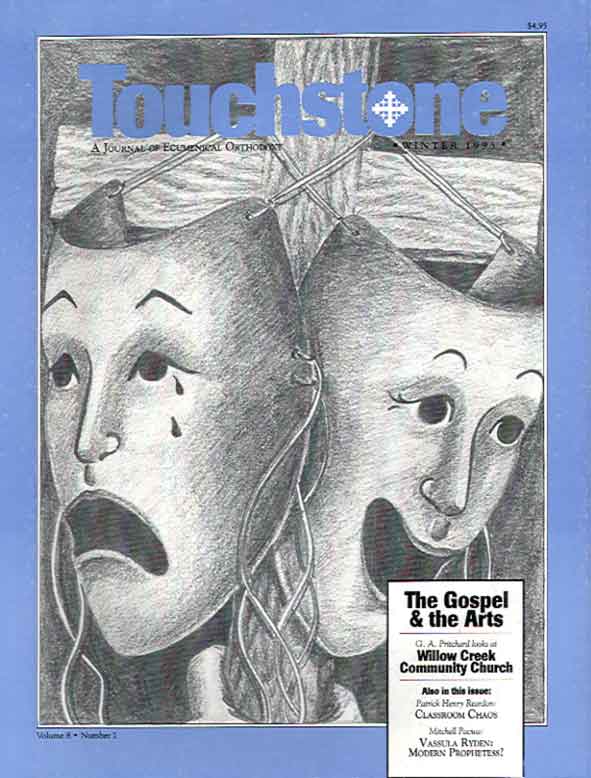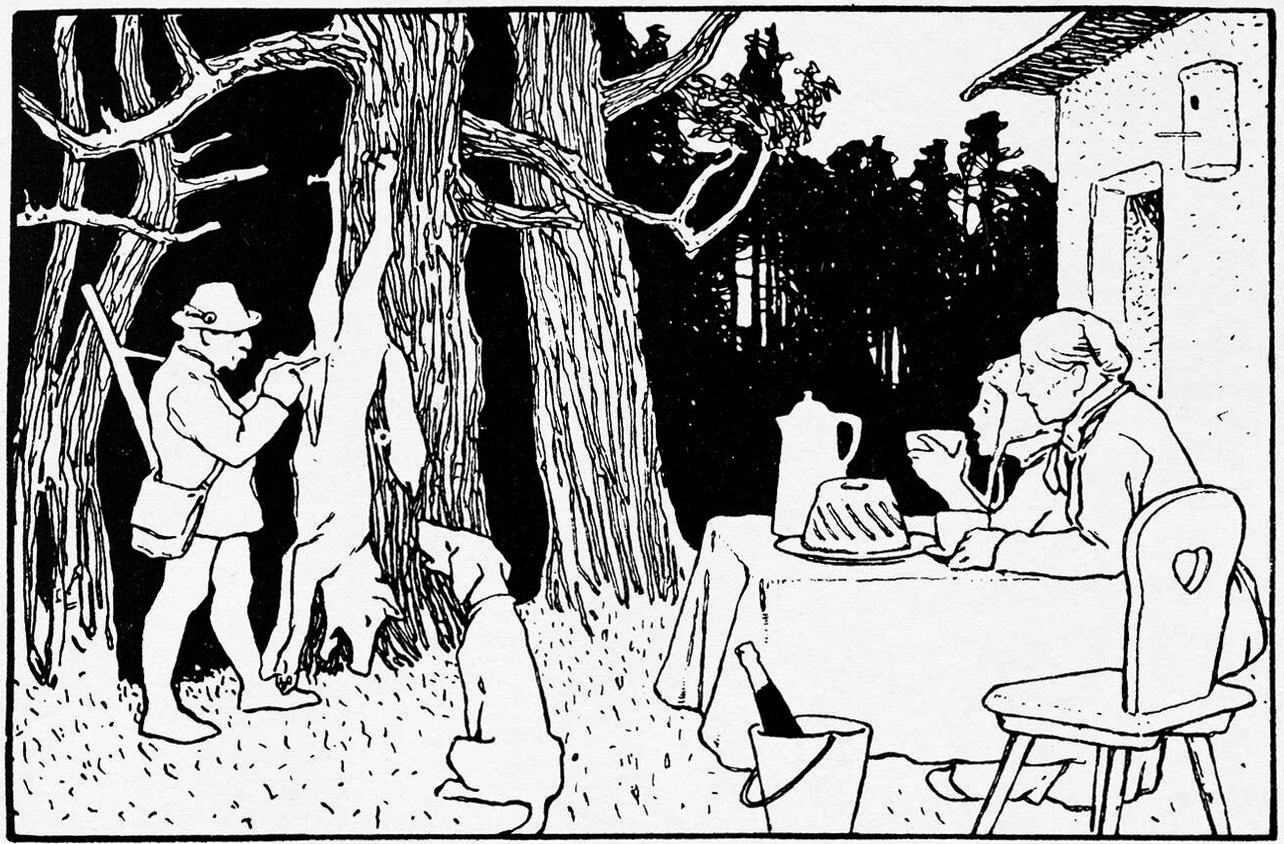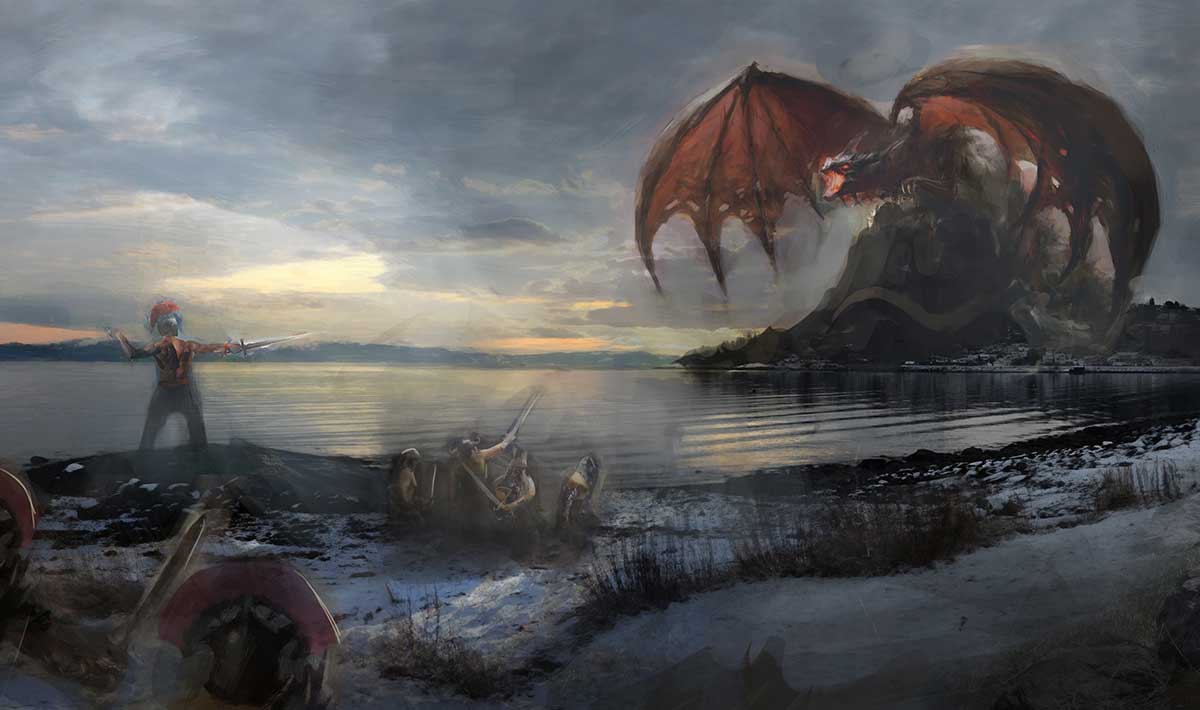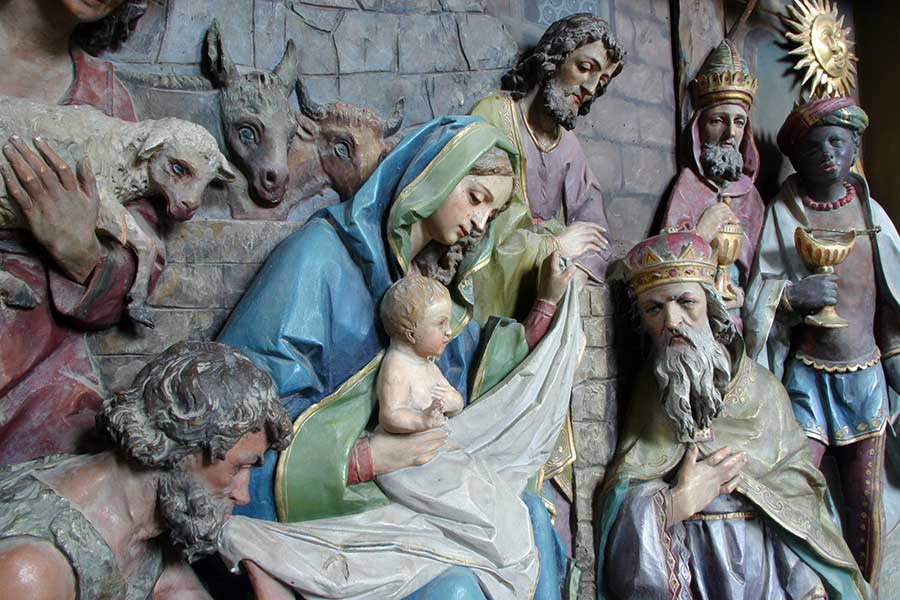Classroom Chaos
Atheism & the Public Schools
by Patrick Henry Reardon
Over the past couple of decades many Christians in this country, feeling a great deal of frustration with our public education, have attempted to deal with the problem in various ways. Some have assumed the enormous task of educating their children at home (cf. Leon Podles, “No Place Like Home,” Touchstone, Vol. 7.4, Fall 1994, pp. 8–13), while others, as though shaking the very dust from their feet, have taken the more public stand of establishing independent Christian schools, following a long tradition of Roman Catholics and certain Lutherans.
The frustration that Christians feel about our public schools is certainly understandable. Not only does the steady annual decline in SAT scores show that these schools are largely failing in their task of education, but a large body of sociological data indicates that they have become spawning beds of violent and other undesirable behavior. The full significance of these phenomena hits us when we ponder that 90 percent of American students are enrolled in these schools. Indeed, it appears to some of us that, were there afoot an actual conspiracy involving the American Federation of Teachers, the National Education Association, the American Civil Liberties Union, the Surgeon General, and the Supreme Court to sabotage the education, moral well-being and physical safety of American children, the results would be close to what we have now.
Even without a conspiracy theory (to which I do not subscribe), it is difficult to avoid the impression that our public schools have been turning large numbers of kids into barbarians and atheists. Leaving aside barbarism, which experience suggests that children can generally manage on their own, something really does need to be said about the privileged place of atheism in the public school systems of this country. Unlike barbarism, atheism does not come naturally. It must be taught, and right now it is certainly being taught.
Three established policies in particular combine to give substance to my contention that atheism is now the dominant ideology in our public schools: the emphasis on evolution in science classes, the departure from the ethical perspectives of the Bible, and the prohibition of public prayer. I propose to comment briefly on each of these policies and on some of the corresponding reforms suggested by Christians in response to them.
Cosmic Chaos
First, there is evolution. Teaching philosophy in a local college over the past several years, I’ve discovered that many of my students are, from an early age, spoon-fed a theory according to which the universe and everything in it resulted from a series of accidents occurring over “millions of years.” (They employ this last expression, by the way, as though it actually corresponded to some real concept of which their heads were in firm and serene possession. Like too many of their teachers, you see, college kids nowadays succumb on occasion to a sort of Nominalism, in the sense that they do not always distinguish sharply between the exercise of the mind and the running of the mouth.) They have sometimes been brainwashed with this theory, accepting it with a mindless faith beyond any that a religious institution would dare require of its members.
These young people have been brought to imagine that, while the evidence of intricate design in eyeglasses and hearing aids, for example, is a sound premise for concluding that these things were fashioned with intelligence and on purpose, no similar argument can be reasonably advanced about the formation of eyes and ears. Such a fancy is so radically at variance with “the instinct for probabilities that we call common sense” (Chesterton) that the participle “brainwashed” is almost too weak to describe its victims. Discussing evolution with me, one of my students confidently affirmed that a group of monkeys, were they left with a typewriter long enough, would eventually reconstruct the entire Bible by pure chance. When I simply replied “No, they wouldn’t,” I rejoiced to detect in his eyes the sudden dawning of a new day.
Often, however, when I draw attention to the a priori implausibility of claiming that the myriad complex systems of the universe are the result of accident (appealing to St. Thomas’s fifth proof), my students sometimes react in disbelief at my daring, as though I had trespassed, still shod, the vicinity of some burning bush. No one seems ever to have suggested to them that the considerable evidence for evolution, both cosmic and biological, is quite compatible with the presumption of teleology, and therefore with the existence of the wise Creator.
There is, moreover, an obvious epistemological difficulty in holding to random evolution. Even the ancient atomist Democritus realized that if the whole universe is haphazard, so are all processes of human thought taking placewithin it, a conclusion that inevitably introduces solipsism and the impossibility of communication. That line of non-thought was long ago laid to rest by Socrates when he gently dismembered poor Gorgias.
In response to the reckless indoctrination of our children with this science fiction version of evolution, many conservative Christians urge that “Creation Science” be taught in school as an alternative explanation of the universe, and they resent the 1987 Supreme Court decision striking down a Louisiana law making such teaching a requirement. Personally, however, I resist the idea of teaching “Creation Science,” not because of scientific reservations (such as those of Austin L. Hughes, “Creation, Science, and the New Gnosticism,” Touchstone, Vol. 6.4, Fall 1993, pp. 20–24), but for theological and philosophical considerations.
Relative to theology: We Christians affirm Creation as a mystery of the Faith, a doctrine of the Church’s Creed. Flesh and blood have not revealed it to us. We know it in the same way that we know the identity of Christ—through the grace and “obedience of faith,” by the testimony of the Holy Spirit in the Church’s proclamation of the gospel. It is a mystery pertaining to the glory of God shining on the face of Jesus Christ. We believe in Creation because we know the Creator: “The God who said ‘let light shine’ in darkness, hath shown in our hearts. . . .” Creation is a theological reference in the strict sense, a component of the biblical truth perceived in Christ.
Consequently, the doctrine of Creation should not be identified or confused with any theory derived from a scientific analysis of the physical world (nor even with the classical “cosmological arguments” for God’s existence, as valid and cogent as I think some of them to be). The very name “Creation Science” encourages such a confusion. Following the example of those conservative Christians who study extra-biblical sources of ancient history to prove that “the Bible got it right,” some Christians imagine that they can do the same thing with a scientific study of the “origins of the universe.” With all due respect to the sincerity of that apologetic intention, there are more serious limits to the latter enterprise.
Relative to philosophy: Since the fatherly framers of the Creed understood the act of Creation to be “from nothing,” there is a mammoth problem with attempting its empirical examination. Just how does one inductively track the “transition” from nothing to something, or even ask the question without seeming foolish? Even with the best of optic advantages, it is hard to gain a sharp gaze at “nothing.” Indeed, the effort is manifestly utopian in the literal sense that there is “no place” ( ou topos) to look. Whatever “Creation Science” thinks it is studying, it is not studying Creation. If, as Christians believe, all things are created ex nihilo, it is obvious that no empirical science can examine the “motion” (Aristotle’s kinesis) by which they exist, the divine act by which they are separated from nothingness.
The manifest impropriety and analogy marking my language here should suggest that we are talking of a divine mystery when we use the word “Creation.” It has no more business in a science course than do “Incarnation” and “Redemption.” Whatever their frustration with the atheism currently favored by the arrogant treatment of evolution in our public schools, I submit that Christians should be very careful lest they come to confuse just another scientific theory with divinely revealed truth.
Moral & Cultural Chaos
Second, there is the departure from biblical norms on moral questions in our public schools. The enormity of this problem is evident in the statistics relative to premarital sex, condoms, abortion, theft, cheating, and violence. Correctly judging that these evils are partly caused by the enforced absence of Holy Scripture from our public schools, many Christians have sought to bring it back somehow.
For example, several years ago the legislature of my native Kentucky passed a bill requiring that the Decalogue be posted in every public school classroom. The legislators hoped, of course, that this procedure might lead to a lessening of social scourges like murder, adultery, stealing, bearing false witness and the failure to honor fathers and mothers. Almost immediately, however, a hardly surprising conjunction of the ACLU and the federal courts removed the Decalogue from those classroom walls. Thus, kids in Kentucky got the message that murder, adultery, stealing, bearing false witness, and the failure to honor parents are somehow integral to their civil rights.
While the courts challenged that legislation on constitutional grounds, it seems that it could also be challenged for theological reasons. The individual requirements of the Decalogue, after all, are not ethical standards in a vacuum. Based on that initial self-proclamation of the saving God and its concomitant interdiction of idolatry, the Ten Commandments are components of a divine covenant. Thus, the action of the Kentucky legislature could have accomplished only one of two things: it could have removed the Decalogue from its defining covenantal context and thus distort it, or it could have suggested that the commonwealth of Kentucky enjoys some special covenant relationship with God. Certain thorny questions would appear to escort either option.
The real task, I believe, is to make our public schools deal realistically with what Russell Kirk called “the moral conversation of mankind.” Can that be done with no reference to the Bible, the major and defining moral text of Western civilization? I don’t see how.
To remove the Bible from the established education of 90 percent of American school children is to deprive them of familiarity with the chief literary font of their own inherited culture. We simply cannot do such a thing and simultaneously describe it as “education.” By analogy, I would insist that my own Christian children, were I raising them in an ambient Hindu or Moslem culture, should learn the Upanishads or the Q’ran respectively, in order to be literate and culturally functional.
We should not underestimate, however, the difficulties attendant on putting the Bible back in public schools. Even if we were able to persuade the public that ignorance of the Bible is incompatible with being a literate and even modestly educated person (which seems obvious to me), just how would we teach the Scriptures in public school?
The usual answer is that we should simply expose children to the Bible as inherited literature, without interpretation or evaluation. Maybe, but permit me a doubt. Can this kind of biblical reading be effected in the public schools when it really hasn’t been done in denominational seminaries, even in those that think they are doing it? Ingenious are the ways already devised to bypass the Bible in courses ostensibly devoted to its study. Given the climate of contemporary education, how long would it be before our kids were learning about J, E, P, D and Q, Proto-Luke, Pseudo-Zechariah and the rest of it? (All with a proper Sitz im Kindergarten, doubtless, so that the little ones could make their existential decision on the authentic Urgrund, if you catch my drift.)
Then again, what translation would be used? A thorough-going Protestant kind, like the New International Version? One of the “supermarket English” variety, such as the New American Bible? A feminist rendition that avoids those dreadful, oppressive, degrading pronouncements like “The Lord is King,” and “Behold the handmaid of the Lord,” and “Abba, Father”?
Finally, if a return to the Bible in our public schools is truly to be part of “the moral conversation of mankind,” which sections would be presented? For example, would that high moral colloquy be significantly enriched by a non-evaluative reading of Amnon’s incestuous rape of Tamar, Jacob’s deception of Isaac, Phineas’s quick action with his trusty spear, or that little incident involving Judah with his daughter-in-law? In short, while we may agree that American kids are being deprived of their cultural and moral birthright by not being taught the Bible as a regular part of their education, it is not yet clear how to implement a remedy for the current misfortune as it pertains to the public schools.
Prayer in Chaos
Third, there is the recently renewed question of authorized prayer in public school, outlawed by the Supreme Court since 1962. (Going even further in 1985, the Court struck down an Alabama law authorizing one daily minute of silence “for meditation or voluntary prayer.”) A national poll reported in the Pittsburgh Post-Gazette (11/27/94) shows that a whopping 80 percent of Americans favor a return to prayer in public schools, while political support for this proposal is wide enough to include figures as diverse as Newt Gingrich and Marion Barry. The general idea seems to be that prayer in school would encourage students to presume the existence of God, a presumption already made by the Pledge of Allegiance, the Declaration of Independence, the inscriptions on American currency, the normal procedures in both legislatures and courts, and other common expressions of theism in American life. All this would seem reasonable enough.
The negative response of civil libertarians, however, sometimes borders on hysteria. For instance, when President Clinton modestly suggested that the matter was open to dialogue (“I’ll be glad to discuss it with them. I want to see what the details are.”), Arthur Kropp of People for the American Way promptly denounced his “gestures to the right wing.” Evidently this “American way” does not include a rational exchange of views.
Leaving aside the “moment of silence” option, I have my own reasons for opposing the recent efforts to return authorized prayer to our public schools. Once again, the reasons are religious rather than political. I appeal to a theological principle, lex orandi est lex credendi, which I would paraphrase as “our prayer says what we believe.”
I am very strict on this point. Their mother and I taught our children to invoke no divinity but the God and Father of our Lord Jesus Christ. Relying on the teaching of Holy Scripture, we believe that our prayer must be based on the two defining affirmations given by the Holy Spirit: “Abba, Father” and “Jesus is Lord.” In short, Christian prayer must be Trinitarian. A general, all-purpose godhead will not do. The substance of my opposition to the return of school prayers is that the God that I believe in may not be the one invoked in those prayers.
This is the reason I try to avoid “ecumenical” worship services where I cannot be sure which divinity will be invoked. Thus, I do not participate in annual interfaith Thanksgiving Day services, high-school baccalaureate celebrations, the dedication of local municipal buildings, and so forth. Whatever godhead is being invoked on those occasions, in my experience, the wording of the prayers does not even faintly hint that it might be the God whose glory shines from the face of Jesus Christ, the only name under heaven by which we must be saved, and the one Mediator between God and man.
Let me candidly illustrate my point, even at the risk of giving further offense. Until recently I experienced no scruples at worshipping with my Methodist friends when they invited me to their church for some special occasion. I regret to say that my conscience can no longer make that safe presumption. Since the publication of the new Methodist service book about three years ago, I might now find myself invoking God as “Grandfather, Great Spirit”, “God, our grove”, “Jesus our Mother”, “our father and mother God,” and (everybody’s all-time favorite) “Bakerwoman.” Even worse, perhaps, are the “trial liturgies” inflicted on some long-suffering Episcopalians in the past few years, where the divinity is described in terms scarcely rising above animism.
Now my question is this: If such idolatry and syncretism have found their way even into those sanctuaries dedicated to the God professed in the Apostles’ Creed, how can I feel any confidence in prayers written by some secular agency? Consequently, in the present circumstances I would be very reluctant to see public prayer returned to public schools.
A Way Out?
It is obvious that I perceive no way to correct the three major policies contributing to the atheism of our public schools. If Christians decide to stick with those schools, they are simply going to have to remedy the influence of those policies within the contexts of their homes and the catechetical programs of their congregations. As traditional parochial schools and more recent efforts among evangelical Protestants have shown, moreover, those catechetical programs can be expanded into full-scale educational enterprises.
The fundamental presupposition of both religious schools and home-based education deserves more attention. Each of these endeavors is based on the persuasion that religious instruction should not be simply tacked onto an otherwise secular education. Ever since Socrates taught that the cultivation of one’s soul is the purpose of life, education has meant, rather, the formation of charakter (internal shape, the moral integration of personality) by the encouragement of arete (virtue, excellence). Real education is qualitative: not how much (quantum) a person knows, but of what sort ( qualis) a person becomes. Following the useful distinction of Irving Babbitt, a truly educated person’s ethical “selection” must give form to his intellectual “sympathy.” The full and proper structuring of conscience is the goal of education. Though we may compensate for their deficiencies, I do not see any way that our public schools can become the instruments for that sort of education in a way satisfactory to Christians.
So, is there no way out? Perhaps there is. We may with profit look at how other Western democracies handle the problems arising from the state’s legitimate interest in mandatory education. In Great Britain, Canada, Australia, France, Germany, Holland, and Denmark the state itself estimates that its own goals of educating the public are well served by providing government assistance, in various ways, for those parents who decide to send their children to religious schools of their own choosing. Why can’t Christians in this country strive politically for this type of arrangement? The slight impulses we have recently seen in this direction in our own country would be greatly strengthened if serious Christians would look more closely at our public schools, ask some uncomfortable questions, and then summon imaginative resources that are committed to the gospel.
Patrick Henry Reardon is pastor emeritus of All Saints Antiochian Orthodox Church in Chicago, Illinois, and the author of numerous books, including, most recently, Out of Step with God: Orthodox Christian Reflections on the Book of Numbers (Ancient Faith Publishing, 2019).
subscription options
Order
Print/Online Subscription

Get six issues (one year) of Touchstone PLUS full online access including pdf downloads for only $39.95. That's only $3.34 per month!
Order
Online Only
Subscription

Get a one-year full-access subscription to the Touchstone online archives for only $19.95. That's only $1.66 per month!
bulk subscriptions
Order Touchstone subscriptions in bulk and save $10 per sub! Each subscription includes 6 issues of Touchstone plus full online access to touchstonemag.com—including archives, videos, and pdf downloads of recent issues for only $29.95 each! Great for churches or study groups.
Transactions will be processed on a secure server.
more from the online archives
calling all readers
Please Donate
"There are magazines worth reading but few worth saving . . . Touchstone is just such a magazine."
—Alice von Hildebrand
"Here we do not concede one square millimeter of territory to falsehood, folly, contemporary sentimentality, or fashion. We speak the truth, and let God be our judge. . . . Touchstone is the one committedly Christian conservative journal."
—Anthony Esolen, Touchstone senior editor









